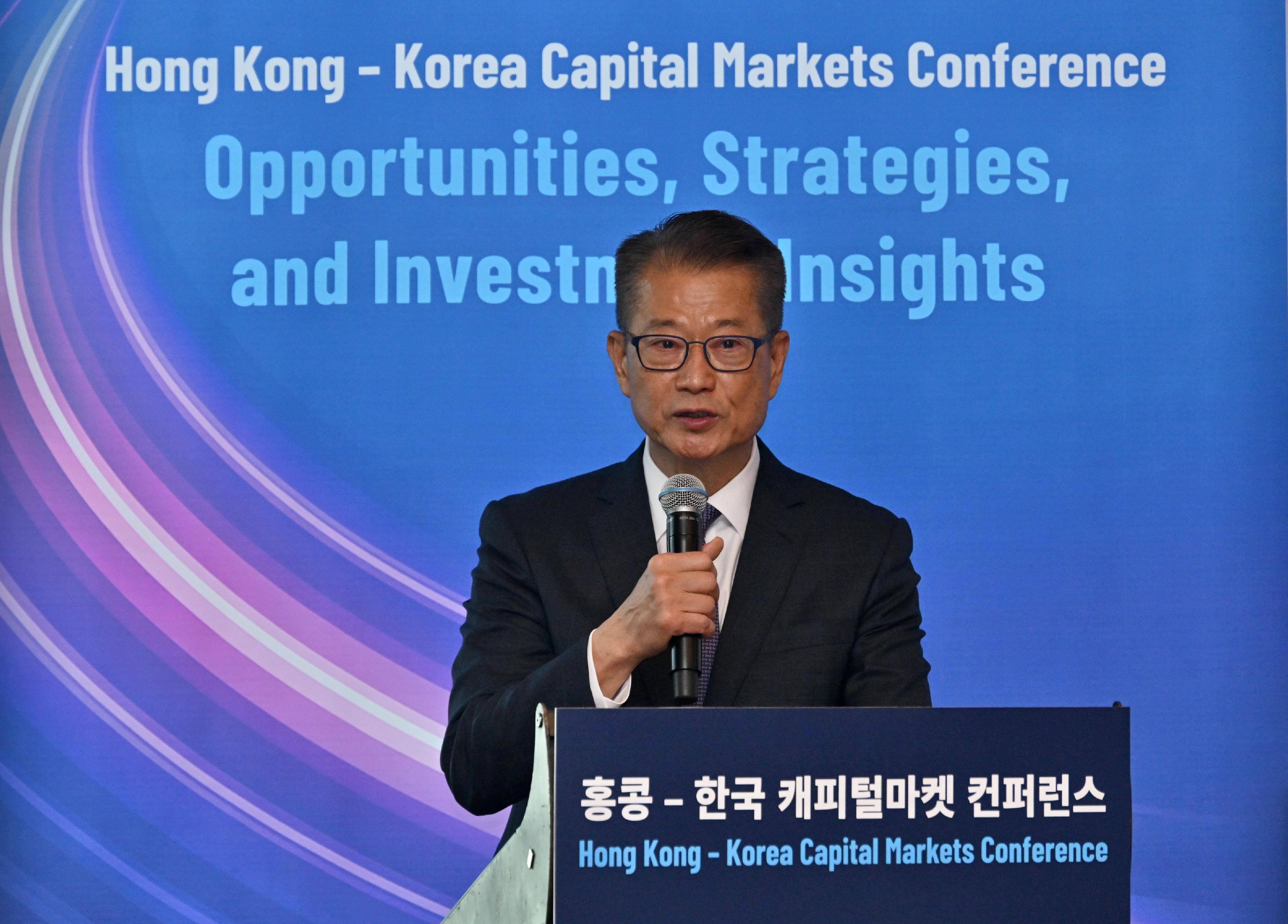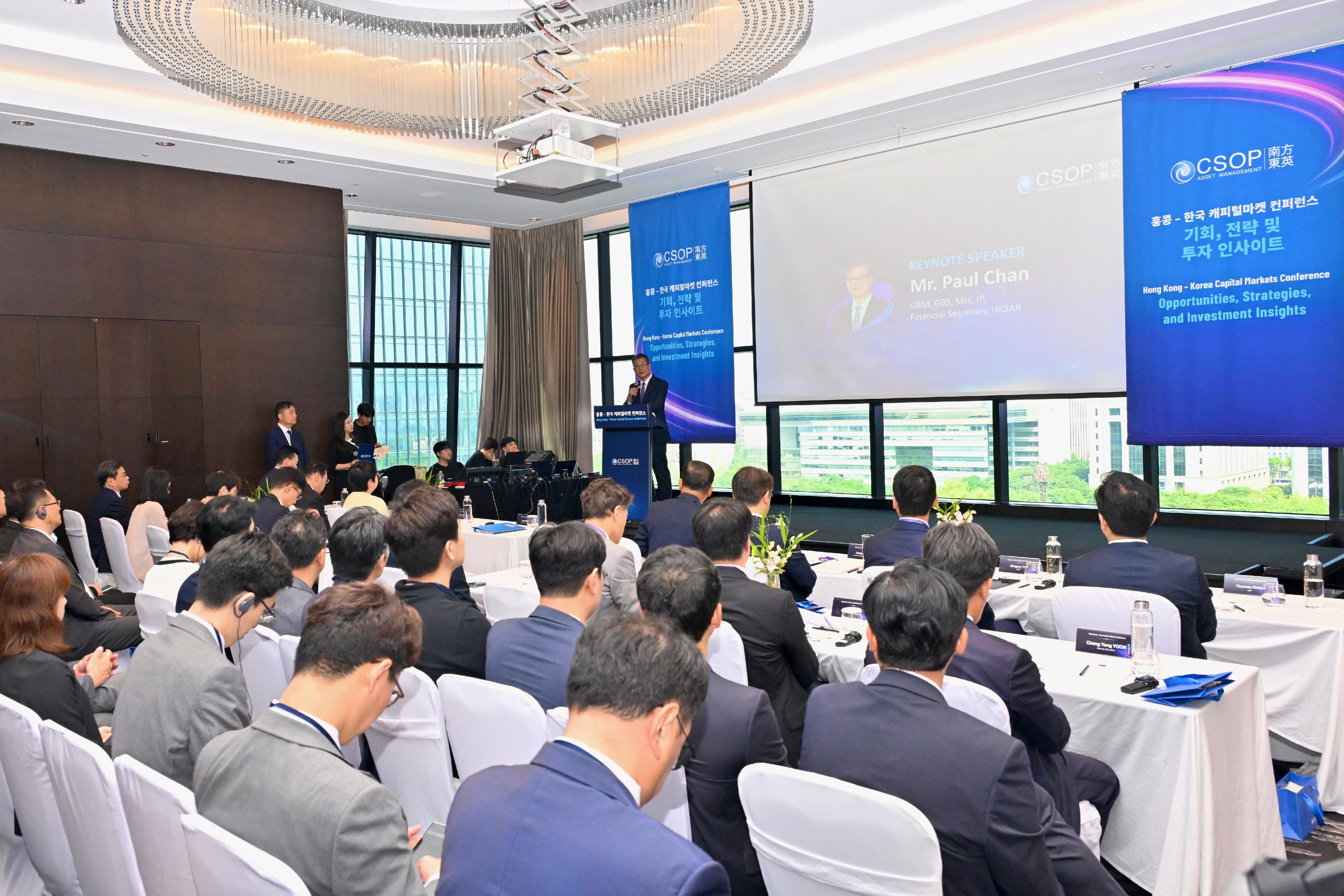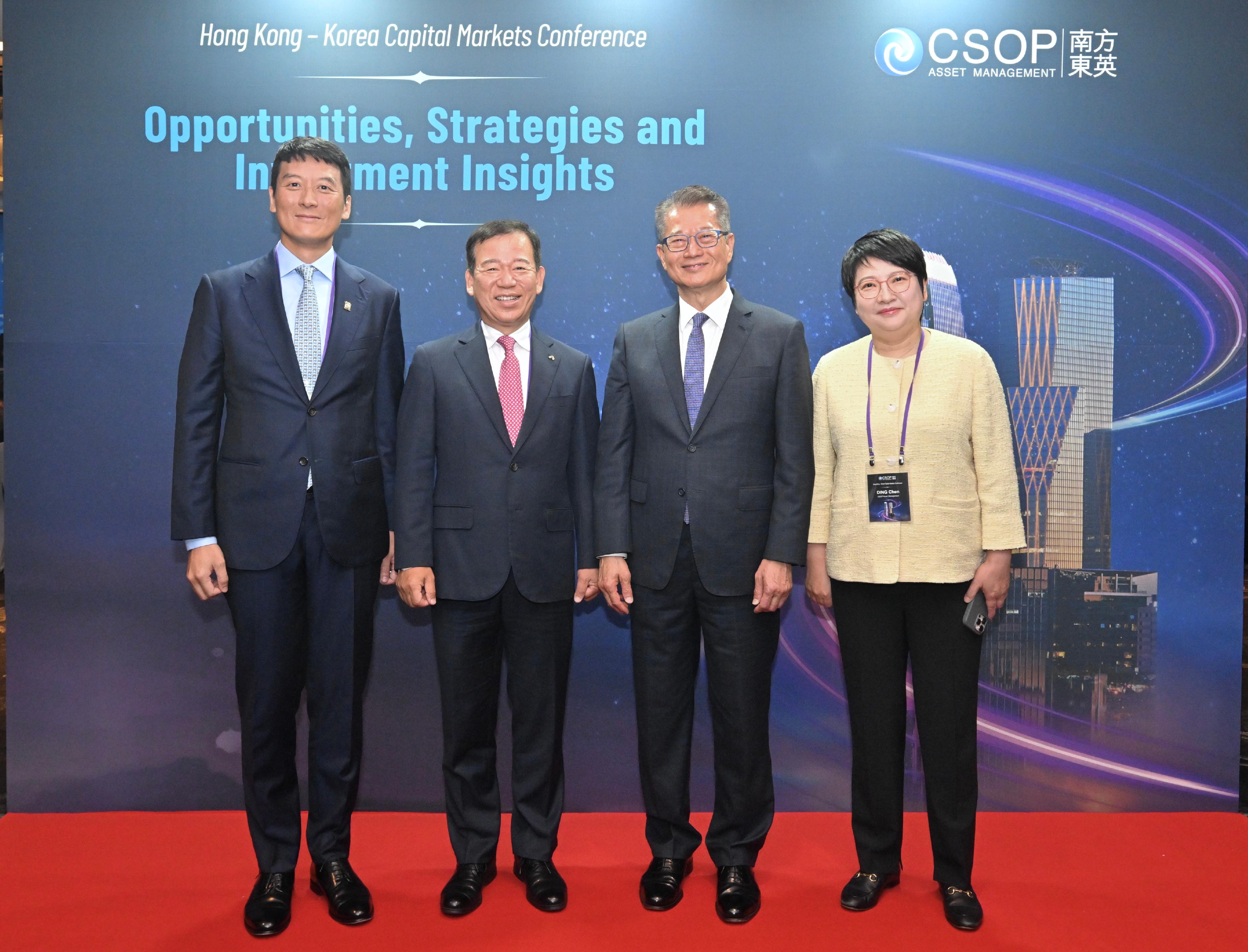Speech by FS at Hong Kong - Korea Capital Markets Conference (English only) (with photos/video)
******************************************************************************************
Mr Seo (Chairman of the Korea Financial Investment Association, Mr Seo Yoo-seok), Greg (Managing Director and Head of Markets, the Hong Kong Exchanges and Clearing Limited, Mr Gregory Yu), Ms Ding Chen (Chief Executive Officer of CSOP Asset Management Limited), ladies and gentlemen,
Annyeonghaseyo. Good morning.
It is a great honour and pleasure to be here with you today in Seoul. I would like to express my sincere appreciation to CSOP Asset Management and all the co-organisers for bringing together such a distinguished gathering. I am especially pleased to see so many esteemed representatives from Korean institutional investors, securities firms, asset managers, regulators, and, of course, our colleagues from Hong Kong's financial community.
Hong Kong: what's up
Allow me to begin with a snapshot of Hong Kong's current position, as reflected in international rankings. This year, Hong Kong is once again ranked among the world's top three financial centres. We were also named as the world's third most competitive economy by Switzerland's IMD World Competitiveness Yearbook. Last year, the Fraser Institute of Canada reaffirmed our status as the world's freest economy. Our city continues to enjoy positive credit ratings from all three major international agencies—Fitch, Standard & Poor's, and Moody's—with stable outlooks.
These accolades are not symbolic. They reflect the resilience of our financial markets and the confidence international investors place in Hong Kong. Last year, our stock market rose by 18 per cent, and it has already gained another 20 per cent so far this year. Initial public offerings (IPOs) have raised about $16 billion this year to date, making Hong Kong the world's leading IPO venue so far this year. Meanwhile, total bank deposits grew by 7 per cent last year, i.e. about US$13 billion, and again by around 7 per cent this year, now surpassing US$2.3 trillion, about 6 times our GDP. Our asset and wealth management sector currently manages around US$4 trillion, and is on track to become the world's top cross-border wealth management centre by 2028.
These positive developments are driven by our strong fundamentals, a steadily growing China and the shifting global financial landscape. At the core of Hong Kong's success are our enduring values: openness, diversity, international character and global connectivity. Under the "one country, two systems" framework, Hong Kong preserves its free port status, with the free flow of capital, information, goods and talent. We uphold the common law system with an independent judiciary. In our Court of Final Appeal, there are six overseas non-permanent judges coming from the United Kingdom (UK), Australia and New Zealand. In the Rule of Law Index of the World Justice Report, Hong Kong ranks among the global top 25, and in the top 10 for free of corruption. Our currency is pegged to the United States (US) dollar and remains freely convertible. The Linked Exchange Rate System functions smoothly despite geopolitical fragmentation, and capital flow volatility.
The Central Government of China has repeatedly reaffirmed time and again that the "one country, two systems" arrangement for Hong Kong is not for expediency; it is here to stay for the long term. As a two-way gateway between the Chinese Mainland and the world, Hong Kong plays a unique and indispensable role for the country's high-level two-way opening up.
Indeed, over the past few years, we have gone through some challenges. But once again Hong Kong has restored political stability as well as law and order, and emerge stronger and more resilient than ever.
Global dynamics and investment trends
Looking ahead, the global political, economic and financial environment are undergoing profound transformations, and this morning I would like to highlight just three key points. First, the geopolitical climate and the policy uncertainty in the United States. These conditions are expected to persist for some time, and have prompted investors to reassess risk, diversify capital allocations and seek markets that offer both resilience and growth. In this context, Hong Kong stands out as a safe harbour for global capital, providing policy consistency, predictability and strategic access to China and the broader Asian region.
Recent data underscores this momentum. The rally in our stock market since last year has been fuelled by both Mainland and international capital. In February this year, Korean investors made their highest monthly net investment in Hong Kong equities in three years. Very good foresight. And they were not alone. Since September last year, waves of capital from the US and Europe had also poured in, as global investors realised that they had under-allocated to the Greater China market.
We expect continued momentum, especially as more high-quality Mainland tech companies choose Hong Kong over US listings. We are also prepared for the return of Chinese concept stocks from the US.
The geopolitical recalibration is not temporary. It will also go beyond the financial market. Economies in our region are already calling for deeper collaboration across trade, manufacturing, supply chains and investment. This presents exciting opportunities for deeper collaboration between Hong Kong and Korea – two of Asia's most dynamic and sophisticated financial ecosystems.
The second point is the rapid acceleration of technological innovation, an area where Asia holds tremendous promise. For example, in China, we are seeing major breakthroughs in artificial intelligence (AI), robotics, electric vehicles, green technologies and advanced manufacturing. Open-source AI models such as DeepSeek are emerging as scalable, cost-effective solutions with wide-ranging applications. Increasingly, Chinese firms are turning to Hong Kong to raise capital to support the expansion of their global footprint.
A recent example is CATL, the world's leading EV (electric vehicle) battery manufacturer, which completed the world's largest IPO so far this year in Hong Kong. The funds raised will support its expansion into Europe, including a new plant in Hungary. Currently, over 200 major Mainland companies are in the pipeline for listing in Hong Kong. Many of them are China's technology and new economy companies.
International investors are increasingly leveraging Hong Kong to take advantage of China's tech sector development. This trend is reflected in the performance of the Hang Seng Tech Index, which has gained more than 40 per cent over the past year, driven by renewed investor interest and optimism.
The third point is the increasing importance of cross-border market connectivity. A unique strength of Hong Kong's capital market is our "Connect Schemes" with the Chinese Mainland, including Stock Connect, Bond Connect, ETF Connect, and more. These schemes are significant in two ways. First, they allow Mainland Chinese capital to flow into Hong Kong's markets, making us a convergence point for international and Mainland liquidity. Second, they offer trusted and familiar channels for international investors to access the Chinese markets. Today, over 70 per cent of A-share holdings by international investors were acquired through the Northbound Stock Connect, and about two-thirds of Mainland cross-border bond transactions are conducted using Bond Connect.
Beyond the Chinese Mainland, we are also expanding mutual market access with other regions. A great example is our growing partnership with Saudi Arabia. In the past two years, we have listed ETFs in our respective stock markets. By the way, one ETF listed on Saudi's market tracking Hong Kong's Hang Seng Index was issued by CSOP. It is now the largest ETF in the Middle East.
Indeed, our Exchange-Traded Products (ETP) market is booming. As of May 2025, Hong Kong hosts more than 210 ETPs with over US$65 billion in AUM (assets under management), a 10 per cent increase year-on-year. Daily trading volumes had more than doubled compared to 2024, exceeding US$5 billion. This year, there have been 24 new product launches, including the cross-listing of the world's fifth-largest ETF from the US earlier this year.
We are actively encouraging global ETPs to enter the Hong Kong market, whether through direct cross-listings or master-feeder structures. Our ETF ecosystem is becoming more diverse and global, with growing demand for thematic products across stocks, fixed income, commodities, currencies and digital assets. In digital assets, Hong Kong leads Asia with 10 ETPs, including both spot and futures-based ones. Their AUM registered a 74 per cent growth year-on-year in the first half of 2025, and a 33 per cent rise in daily turnover.
Some Korean firms are already active in our ETP market as issuers and market makers. We believe it is now the opportune moment to deepen our collaboration in this space through cross-listings, reciprocal arrangements and master-feeder partnerships.
Our HKEX colleagues will elaborate on these exciting opportunities shortly.
Finally, let me now turn to digital assets, a frontier where Hong Kong is taking bold and forward-looking steps to become a global hub. Our approach is pragmatic, risk-based and innovation-friendly. We believe digital assets will play a transformative role in de-intermediation and cross-border settlement. That said, we are also clear-eyed: appropriate regulatory safeguards are essential.
We have launched a licensing regime for Virtual Asset Trading Platforms, guided by the principle of "same activity, same risk, same regulation". Sound regulation, we believe, is not a constraint, but a catalyst for sustainable innovation. So far, we have licensed 11 VATPs, with balanced requirements on custody, anti-money laundering and investor protection.
We also support tokenisation across traditional finance, from green bonds to asset-backed security tokens and structured products.
Building on this foundation, we have passed legislation for stablecoins, which will come into effect on August 1. Our goal is to support stablecoins that serve real-world use cases, reducing transaction costs and enabling faster, safer cross-border payments.
Hong Kong's digital asset ecosystem continues to thrive, and many Web3 innovators are choosing to base themselves in our city. We see tremendous potential for Korean innovators and investors as well.
Concluding remarks
Ladies and gentlemen, I cannot better conclude by highlighting the compelling advantages we offer to Korean investors: no dividend tax, no capital gains tax, a low profits tax at only 16.5 per cent, trading in multiple currencies, including HKD, USD and RMB, and trading hours aligned with the Asian time zone.
Above all, we are entering a new era for Asia. Geopolitics, technological innovation and regional integration are converging. While they present challenges, they also create unprecedented opportunities. Hong Kong stands ready to be your partner, offering stability in uncertain times, unparalled access to the world's fastest-growing markets, and a platform built on transparency, trustworthiness and innovation.
Together, Hong Kong and Korea can build stronger bridges, unlock new investment frontiers, and shape the future of finance in Asia and beyond.
Kamsahamnida. Thank you.
Ends/Wednesday, July 9, 2025
Issued at HKT 10:52
Issued at HKT 10:52
NNNN





